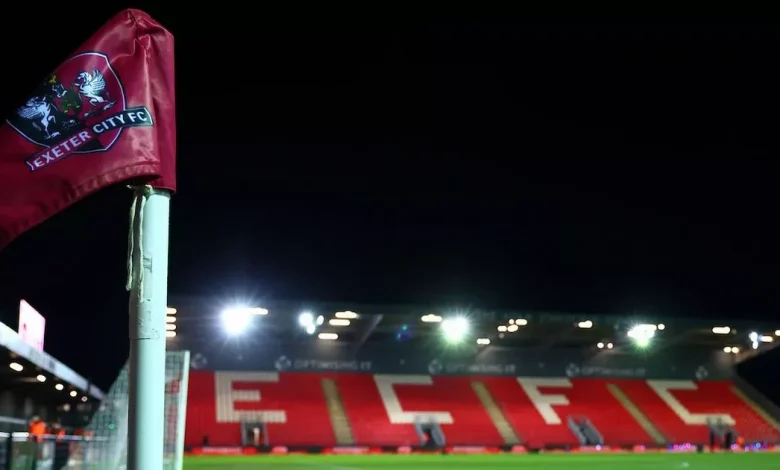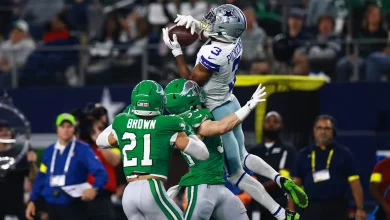Exeter City fans get answers on finances – and makes for pretty grim news

Three significant breaches that could have led to severe consequences for the football club, but they have fortunately been spared.
Stuart James Print Sports Editor
05:58, 13 Nov 2025
A general view during the Sky Bet League 1 Match between Exeter City and Leyton Orient at St James Park, Devon on 28 January 2025. Photo: Luke Williams/PPAUK
THE answers that Exeter City fans have long been asking for were finally answered by outgoing interim chair Clive Harrison at the Supporters’ Trust AGM on Saturday – and while it made for pretty grim hearing, it could have been a whole lot worse.
Ever since the sudden resignation of chief executive Joe Gorman in June, which was swiftly followed by the departure of club and Trust chairman Nick Hawker, a shroud of secrecy has enveloped the club with fans questioning what exactly has gone on.
Now, in front of a packed room at Exeter College, Harrison revealed three significant breaches that could have led to severe consequences for the football club, but they have fortunately been spared.
In addressing the room, Harrison said: “Many of the circumstances around how we got here today were going on outside the club all along and the main thing that has hit us now is that where we saw these problems coming in 18 months-two years, that is now in front of us right here, right now. We need to act quickly as a club and Trust board to look at those challenges and identify how we are going to face those.
“In early June, the club became concerned about certain operational issues and at that stage, the chief executive (Gorman) tendered his resignation at a board meeting and days later, was placed on gardening leave in line with his contract of employment.
“We didn’t let him leave straight away because we wanted him available to us to pretty much answer any questions that we had and at the time, we needed to focus in on certain areas that were of grave concern to us. Three things came up and the club board investigated those and then an external partner also investigated those and they found those themselves and a few others.
“Firstly, the financial forecasts and cash balances that the club and Trust board were presented with to make their decisions for future years were found to have been inaccurate.
“Secondly, the club and Trust have an agreement – you will know in the CTA – where contracts costing more than £50,000 require Trust board approval, although there are some exclusions to that. An investigation found one material contraction was in breach of this agreement and that limit was exceeded.
“Thirdly, and in the October 14 statement that the club issued, there was one other issue that we weren’t able to discuss at that time and there were reasons for that and it is still an ongoing issue.”
City supporters were told of an ongoing review at various Trust meetings and even a Trust Fans’ Forum, in which Harrison tried to appease some of the speculation around the club, but those fans left frustrated at the length it took and lack of information forthcoming, especially with the Trust’s ethos of being ‘open, honest and transparent’ with its members.
Harrison continued: “The review conducted in the summer, followed by an independent investigation, it was discovered that there had been a breach of compliance around submitting two VAT payments in HMRC. Upon identifying this breach, the club immediately reported it to HMRC and provided full disclosure including evidence provided by an outside accountancy firm. They basically produced a report on what happened and that then was our defence and sent off to HMRC.
“We also made payment and implemented correct measures to prevent any reoccurrence and the club is now not in arrears with HMRC payments, nor any other tax. Neither were the FA or were the police involved.
“The club acted properly and provided a transparent response and HMRC imposed no penalty, only requiring a VAT payment interest-wise on what we had owed for that period of time.
“Communication with our supporters is always a balance between transparency and disclosing information which could cause commercial disadvantage or, in this case, it was considered that by declaring publicly, this could have led to a substantial penalty.”
It is believed that the club are seeking forward financing to address a serious cash issue at the club now with Harrison highlighting the financial costs of being in League One. Being a supporter-owned football club is certainly romantic and is certainly novel in English football, but for all the emotion and romance it generates, it does lack one vital ingredient to be successful – and that is money.
“What’s happened has probably brought forward the inevitable. What it has done is reduce the amount of time that we can react to these things and that is the real damage.
“Football is changing rapidly and how transfers are conducted is changing and if we take the Jay Stansfield transfer and sell-ons as an example, Exeter City needs that money when the transfer happens, not seven years later.
“The Jay Stansfield financing to us was over seven years with the majority of that money in the last two years and what we were left with was a corporation tax bill which we had to pay right at the beginning, so Jay Stansfield – great news for the club – actually cost us money.
“Gary and his team have done outstanding things in order to try and close the gap that we face as a Supporter-owned club, but we all do need to face the reality and those are that since 2024 and today – just two years – Exeter City’s playing budget has increased by nearly £1 million – 40 per-cent in two years. The reality is that the League One average is £3.5 million. Even for us to add 40 per-cent in two years has left us £2.5 million behind everybody else’s increase.
“The average League One playing budget is £7.6 million. There are five clubs in League One with a playing budget higher than £10 million and the highest is £19 million. This season, our playing budget is likely to be the lowest in League One and if we are working on money alone, we will get relegated.
“Gary is not working on money alone, he is working in many other ways in order to close that gap – not just with one or two teams, but every other team in the league. If we were in League Two now, our playing budget would be eighth and even if we dropped down into non-League, our playing budget still wouldn’t be the largest, so you can see the difficulties.
“That’s the reality and the challenge we face in 2025/26 and in the coming months, this challenge will be at the forefront of the new board’s thinking, joined by a largely refreshed Trust board.
“We have made appointments on the club board to assist with our forward planning business-wise, which is where Richard comes in and of course Laurence Overend, who has huge experience with the Trust in the past and he will be the club board vice-chair with his responsibilities largely maintaining the communication between the two boards.”
Harrison has since even replaced as interim chair with the club appointing Richard Pym as chairman. Laurence Overend is also back on the club board as vice-chairman with Harrison admitting the last four months were far worse than he could have imagined.
“The last four months has been really difficult,” he said. “When I took on the role of interim chair, I was under no illusion how difficult it would be. It was worse – much worse – and the events have certainly taken their toll on others at the club and within the Trust.
“There have been redundancies, resignations and budget cuts and everyone’s job has become harder but even then, our staff and volunteers turn up every day full of enthusiasm for the love of Exeter City and put in an extraordinary amount of work.
“It would be no exaggeration to say that, as director of supporter engagement and engaging for the last seven years, the last four months – as director of the club – have been hard to not be able to engage. That doesn’t come naturally to me and during that time, I have had to make decisions and those decisions have always been with the legal advice we have been provided.
“I am not going to stand here and say everything was right, but what I will say is that nobody else in this club’s history has faced similar situations. We have been guided by that legal advice and we have come to the end of that process where we understand more about what happened, how we got here and what we need to do in the future.
“Now, it is easy to look back and say ‘we could have done this, perhaps we could have done that’ but in the heat of the situation when threatened with legal action pretty much all the way through, you take the decisions that you feel you need to take for the benefit of the club and those decisions must never be to further damage the club.”
At Saturday’s AGM, six new Trustees were voted onto the new Supporters’ Trust board following an ongoing election over the last few weeks.
Matt Phillips, Gary Quick, Tony Badcott, Richard Knight, Nigel Edwards and Debbie Marrable were the chosen ones and they now join Julen Beer, Peter Ferlie, Doug Gillard, Neil Le Milliere and Debra Noble on the Trust board.
Phillips, Quick and Edwards stood as candidates representing the the ‘Trust In Change’ movement, a group set up by disenchanted supporters unhappy with the current running of the club and Trust and keen to fix governance and improve communication.
On the eve of the Trust election, interim Trust chairman Nick Edwards resigned from his role on the Trust Finance Group. As a result, he felt his role as interim chairman therefore became untenable and he decided to stand down from all roles he had within the Trust and as a director on the Club Board.
He was joined by Steven Chudley and Peter Holding in standing down from positions on the TFG.
Holding resigned after being co-opted to the Trust board back in the summer, while Chudley also stepped away from his role as Trust finance officer and club director. He initially stayed involved with Trust and club finance and governance committees, but resigned from those roles last week.





